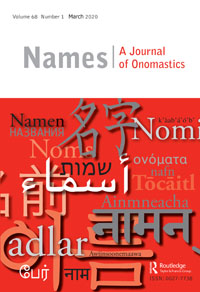Greece, the Netherlands and (the) Ukraine: A Corpus-Based Study of Definite Article Use with Country Names
Published 2020-01-02
Copyright (c) 2020 The Author(s)

This work is licensed under a Creative Commons Attribution 4.0 International License.
Abstract
This study investigates the grammatical behavior of English country names based on corpus linguistic evidence. An overview of the basic patterns of definite article use with country names as commonly described in English reference grammars and of the morphological structures of English country names is presented. Against this backdrop, the Corpus of Contemporary American English (COCA) is used to explore which (groups of) country names occur more or less frequently with a definite article. The data analysis reveals that virtually all of the English country names examined are, to some extent, used in the syntactic position following a definite article. It is shown that certain grammatical constructions call for the use of a definite article in connection with country names. However, the morphology of the country names also has a strong influence on how often they are used with a definite article. Furthermore, it is argued that the minority of English country names that do not fit this morphological pattern may differ because they derive from other place name types that generally take a definite article.
References
- Anderson, John M. 2007. The Grammar of Names. Oxford: Oxford University Press.
- Back, Otto. 1996. “Typologie der Ländernamen: Staaten-, Länder-, Landschaftsnamen.” [Typology of Country Names: State, Country and Areal Names]. In Name Studies: An International Handbook of Onomastics: Volume 2, edited by Ernst Eichler, Gerold Hilty, Heinrich Löffler, Hugo Steger and Ladislav Zgusta, 1348–1356. Berlin: de Gruyter.
- Berezowski, Leszek. 1997. “Iconic Motivation for the Definite Article in English Geographical Proper Names.” Studia Anglica Posnaniensia 32: 127–144.
- Berezowski, Leszek. 1999. “Going, Going, Gone? The Future History of the Definite Article in English Names of Countries.” Anglica Wratislaviensia 34: 41–55.
- Berger, Dieter. 1996. “Morphologie und Wortbildung der Ländernamen.” [Morphology and Word Formation of Country Names] In Name Studies: An International Handbook of Onomastics: Volume 2, edited by Ernst Eichler, Gerold Hilty, Heinrich Löffler, Hugo Steger and Ladislav Zgusta, 1356–1360. Berlin: de Gruyter.
- Davies, Mark. 2009. “The 385+ Million Word Corpus of Contemporary American English (1990–2008+): Design, Architecture, and Linguistic Insights.” International Journal of Corpus Linguistics 14, no. 2: 159–190.
- Davies, Mark. 2010. “The Corpus of Contemporary American English as the First Reliable Monitor Corpus of English.” Literary and Linguistic Computing 25, no. 4: 447–464.
- Haschka, Christine. 1989. “Genus- und Artikelgebrauch bei Ländernamen im Französischen und Deutschen.” [Gender and article usage with country names in French and German]. Lebende Sprachen 34, no. 2: 73–75.
- Hewson, John. 1972. Article and Noun in English. The Hague: Mouton.
- Horowitz, Franklin E. 1990. “ESL and Prototype Theory: Zero vs. Definite Article with Place Names.” In Grammatical Studies in the English Language, edited by Dietrich Nehls, 95–112. Heidelberg: Julius Groos.
- Jespersen, Otto. 1954. A Modern English Grammar on Historical Principles. Part VII: Syntax. Copenhagen: Einar Munksgaard.
- Kjellmer, Göran. 2002. “The Britain: An Unexpected Case of Article Usage in Present-Day English.” In From the COLT’s Mouth – and Others’: Language Corpora Studies in Honour of Anna-Brita Stenström, edited by Leiv Egil Breivik and Angela Hasselgren, 167–180. Amsterdam: Rodopi.
- Millar, Robert McColl. 1996. “‘Why is Lebanon called the Lebanon?’: Some Suggestions for the Grammatical and Sociopolitical Reasonings Behind the Use or Non-Use of the with the Names of Nation States in English.” Notes and Queries 43, no. 1: 22–27.
- Piotrowski, Tadeusz. 1998. “Changing Usage in American English: The Case of (the) Ukraine.” Anglica Wratislaviensia 33: 147–154.
- Quirk, Randolph, Sidney Greenbaum, Geoffrey Leech, and Jan Svartvik. 1985. A Comprehensive Grammar of the English Language. Harlow: Longman.
- Rastall, Paul. 1995. “Definite Article or No Definite Article?” English Today 11, no. 2: 37–39.
- Seppänen, Aimo. 1982. Restrictive Modification and Article Usage with English Proper Names. Umea: Umea University.
- Thieroff, Rolf. 2000. “*Kein Konflikt um Krim: Zu Genus und Artikelgebrauch von Ländernamen.” [*No Conflict Around Crimea: On Gender and Article Use of Country Names]. In Botschaften verstehen: Kommunikationstheorie und Zeichenpraxis. Festschrift für Helmut Richter, edited by Helmut Richter, Ernest W. B. Hess-Lüttich and H. Walter Schmitz, 271–284. Frankfurt am Main: Peter Lang.
- Tse, Grace Y. W. 2005. A Corpus-Based Study of Proper Names in Present-Day English: Aspects of Gradience and Article Usage. Frankfurt am Main: Peter Lang.
- van Langendonck, Willy. 1998. “A Typological Approach to Place-Name Categories.” In Scope, Perspectives and Methods of Onomastics: Proceedings of the XIXth International Congress of Onomastic Sciences, Aberdeen, August 4–11, 1996. Volume 1, edited by Wilhelm F. H. Nicolaisen, 342–348. Aberdeen: University of Aberdeen.
- van Langendonck, Willy. 2004. “Proper Names and Forms of Iconicity.” Logos and Language 5, no. 2: 15–30.
- van Langendonck, Willy. 2005. “Proper Names and Proprial Lemmas.” In Proceedings of the 21st International Congress of Onomastic Sciences (Uppsala, 19–24 August 2002), edited by Eva Brylla and Mats Wahlberg, vol. 1, 315–323. Uppsala: Språk- och Folkminnesinstitutet.
- van Langendonck, Willy. 2007. Theory and Typology of Proper Names. Berlin: Mouton de Gruyter.
- Vandelanotte, Lieven, and Peter Willemse. 2002. “Restrictive and Non-Restrictive Modification of Proprial Lemmas.” Word 53, no. 1: 9–36.

